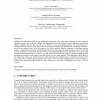326 search results - page 2 / 66 » Can Affect Be Detected from Intelligent Tutoring System Inte... |
AIED
2005
Springer
13 years 11 months ago
2005
Springer
A student's goals and attitudes while interacting with a tutor are typically unseen and unknowable. However their outward behavior (e.g. problem-solving time, mistakes and hel...
UMUAI
2008
13 years 5 months ago
2008
Abstract. Self-efficacy is an individual's belief about her ability to perform well in a given situation. Because selfefficacious students are effective learners, endowing int...
HCI
2009
13 years 3 months ago
2009
This paper describes two affect-sensitive variants of an existing intelligent tutoring system called AutoTutor. The new versions of AutoTutor detect learners' boredom, confusi...
IADIS
2003
13 years 7 months ago
2003
Intelligent tutoring systems (ITS) provide individualised instruction. They offer many advantages over the traditional classroom scenario: they are always available, non-judgement...
HCI
2009
13 years 3 months ago
2009
In this paper we take a closer and in-depth look at initial results obtained from a previous novel experiment conducted with a 3D subliminal teaching Intelligent Tutoring System. S...

